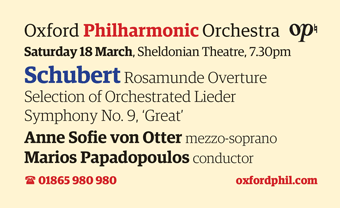Swedish mezzo-soprano Anne Sofie von Otter was the latest of the Oxford Philharmonic's famous names to appear at the Sheldonian on Saturday night, performing a short programme of six lieder with orchestra. If not quite such an exotic figure as Renee Fleming who sang at the same venue last summer, perhaps because she's a more constant presence in European concert halls, Ms von Otter likewise attracts a dedicated fan-base. This was a Schubert concert and the composer had a hand in every item of the programme, songs included.
In a long emerald dress, Ms von Otter began her eclectic recital with Romanze aus Rosamunde, a song of longing, before moving on to the well-known Gretchen at the Spinning Wheel, delivered with beseeching emotion. Next was Britten's clarinet and strings arrangement of the even more famous Trout, sung with dancing vivacity, as was Sylvia, taken from Shakespeare's Two Gentlemen of Verona, and pregnant with a throbbing countermelody from cellos and basses. Im Abendrot was a moving evocation of nature, while the concluding piece was Erlkonig, an episode from a morbid folk tale ending upon the single, abrupt word 'tot' [dead]. At 62, Ms von Otter has to husband closely the resources of her voice. Whilst her appearance was brief, the applause she received was heartfelt, acknowledging a long career in the concert and opera house as well as a long-standing association with Deutchse Grammophon. My mole at Covent Garden, Beau Marshall, spoke admiringly of having heard her recently in Der Rosenkavalier.
The evening had commenced with the overture to the 1823 play Rosamunde, a jolly affair after the initial swirling melody that announces Schubert's supreme facility as a tunesmith. The orchestra was lacking a number of familiar names and faces from both string and wind sections, though I noticed no faltering in quality. The bolstering from Eastern Europe of the former section has, I think, been one of the great achievements of music director Marios Papadopoulos.
After the interval we got down to the bones and sinews of the programme, Schubert's Symphony No. 9, 'Great'. The programme notes spoke amusingly of how 'on the continent there has been a rearguard action to re-number Schubert's symphonies'. Be that as it may, this was the composer's final symphony. When written it was the longest symphony yet known and the cause of protests and strikes by the musicians rostered to play it. As modern context, clarinettist David Rix told me at the interval that he'd once had to play this and two other Schubert symphonies to boot on one and the same day. We plunge straightaway into the first theme from a pair of horns, soon taken up by the three trombones, a pleasingly strong presence. Schubert is generous to the woodwind in this work, frequently giving them the real meat of the piece while the strings must be content with repetitive figures, and how the players responded, bassoons and oboes ushering in the second tune and then later the winds in unison thrilling us with three rising notes turning into an exultant melody.
Marios Papadopoulos, conducting without a score, was unusually expansive and demonstrative in gesture, suggesting this is a work he especially treasures. He brought out what the programme aptly calls the 'tramping rhythm' at the start of the 'andante', somewhere between a gavotte and a march, and later he whirled out the dramatic climax followed by a moment of stunned silence. In the driving rhythms of the 'scherzo' I noticed several pairs of the cellos and 2nd violins smiling broadly to each other their pleasure in the music. In the finale Maestro Papadopoulos spun almost like a top on the podium, squeezing out energy from his players. This was a diamond of the repertoire, polished to a shine little short of brilliance on this Saturday night.





